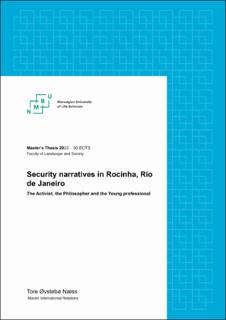| dc.description.abstract | This master thesis explores and examines security narratives from Rocinha, the largest favela in Rio de Janeiro, Brazil. It employs a narrative approach to security in International Relations, mixing analytical insights and theoretical perspectives from human security research, feminist security studies and urban studies. It aims to provide an empirical contribution to the security debate in the city, foregrounding residents in Rocinha’s security concerns, which vulnerabilities they express and strategies they employ to navigate insecurity in the city. It aims to get a broader understanding of the security dynamics in the city and multiple (in)securities beyond the traditional security perspective, concerning police and organized crime.
For this thesis, I travelled to Rio de Janeiro for a nine-week long field trip from April to June 2022. I interviewed seventeen research participants, mainly residents in Rocinha and a few participants who lived outside the neighbourhood. I found that residents were more concerned with everyday insecurities than shootouts between the police and groups of organized crime. I further found that residents longed to be included in the city’s social fabric where they could take part in the city and enjoy access to the same rights, resources, opportunities and freedom as other privileged citizens do. Lastly, I found that residents employed various strategies to deal with territorial stigmatization and navigate insecurity in the city.
Based on these findings, there is no quick fix for urban challenges such as social inequality, poverty and organized crime in Brazil and beyond. However, this thesis's findings have argued it is necessary for academics and policymakers to talk, listen and cooperate much more with people “on the ground”. Security may mean something different depending on whom you are talking to. | |
